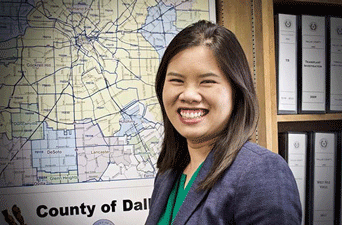The global COVID-19 crisis will require scientists and scholars who are educated and trained to take on the world’s most dangerous problems. The Biodefense program at the Schar School creates leaders in the field.

Tam Dang earned a Bachelor’s of Science degree from Mason, then a Master’s in Biodefense at the Schar School.
Dallas County, like many U.S. jurisdictions, is working to minimize the risk of an outbreak of coronavirus while also providing information about the outbreak to citizens. In the middle of it is Tam Dang.
Dang started in the biology world, earning her Bachelor’s of Science degree from George Mason University in 2008. But it was her course of study in the Master’s in Biodefense program at the Schar School that put her on her present career path.
The degree, she said, “introduced me to the public health field, and offered a unique perspective from a biosecurity and bioterrorism standpoint.”
Today, Dang is an epidemiologist for the Dallas County Department of Health and Human Services in Dallas, Texas. She works in the Acute Communicable Disease Epidemiology Division, helping to lead epidemiological investigations for infectious disease outbreaks or potential bioterrorism events. She monitors local, regional, and state data sources related to infectious diseases, and helps develop outbreak and bioterrorism plans to help support public health preparedness.
Her work is at the intersection of public health and health security, an important field in the modern era.
"I think some significant health security threats we are facing in the U.S. in 2019 are related to the potential for importations or outbreaks of high-consequence emerging infectious diseases, such as Ebola and avian influenza,” she said. “In a metropolitan area like Dallas/Fort Worth, our Public Health Emergency Preparedness division is keenly aware that our proximity to the nation’s 12th busiest airport confers particular risk for international importations of infectious diseases.”
Since joining the epidemiology team, Dang, who has since by joined by fellow Schar School 2019 biodefense master’s degree graduate Stephen Taylor, has found plenty of ways to leverage her biodefense degree. She has developed communicable disease and emergency response plans, facilitated a pandemic influenza exercise for medical students at the University of Texas Southwestern Medical Center, and presented on insider threats in biosafety laboratories to sentinel lab personnel, to name a few.
Her degree from the Schar School’s biodefense program was key to landing her current position, she said.
“It helped me stand out from the pile of applications my supervisor received,” she said. “My biology background and prior employment experiences also played a large part in rounding out my graduate education and narrowing my professional field of interest.
“Overall, past experience and the added education and skills I obtained from the Biodefense program were critical factors in helping me pursue my career goals."
Additional reporting by Buzz McClain
